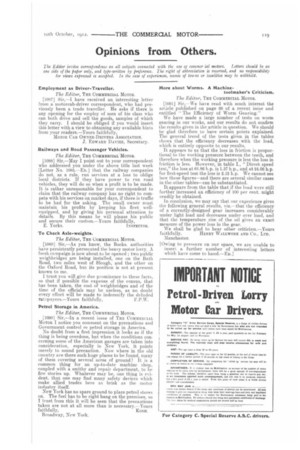Opinions from Others.
Page 17

If you've noticed an error in this article please click here to report it so we can fix it.
The Editor invites correspondinw on all subjects connected with the use of commer ml motors. Letters should be on one side of the paper only, and type.written by preference. The right of abbreviation is reserved, and no responsibility for views expressed is accepted. In the case of experiences, names of towns or localities may be withheld.
Employment as Driver-Traveller.
The Editor, THE COMMERCIAL MOTOR.
D087] Sir,—I have received an interesting letter from a motorcab-driver correspondent, who had previously been a trade traveller. He asks if there is any opening for the employ of men of his class who can both drive and sell the goods, samples of which they carry. I should be obliged if you would insert this letter with a view to obtaining any available hints from your readers.—Yours faithfully,
MOTOR CAB OWNER-DRIVERS ASSOCIATION.
j. EDWARD DAvins, Secretary.
Railways and Road Passenger Vehicles, The Editor, THE COMMERCIAL MOTOR.
[1088] Sir,—May I point out to your correspondent who addressed you under the. above title last week [Letter No. 1085.—ED.] that the railway companies do not, as a rule, run services at a loss to oblige local districts. If they have power to run road vehicles, they will do so when a profit is to be made. It is rather unreasonable for your correspondent to claim that the railway company has no right to compete with his services on market days, if there is traffic to be had for the asking. The small owner must maintain his profits by keeping his fleet wellequipped, and by giving his personal attention to details. By this means he will please his public and secure their custom.—Yours faithfully,
E. Yorks. INSPECTOR.
To Check Axle-weights.
The Editor, THE COMMERCIAL MOTOR.
[1089] Sir,—As you know, the Bucks. authorities have persistently persecuted the heavy motor lorry. A fresh ettinnaign is now about to be opened ; two public weighbridges are being installed, one on the Bath Road, two miles west of Slough, and the other on the Oxford Road, but its position is not at present known to me.
I trust you will give due prominence to these facts, so that if possible the expense of the census, that has been taken, the cost Of weighbridges and of the time of the officials may be useless, as no doubt every effort will be made to indemnify the deluded ratep ayers.—Yours faithfully, Petrol Storage in America.
The Editor, THE COMMERCIAL MOTOR.
[10901 Sir,--In a recent issue of THE COMMERCIAL MOTOR I notice you comment on the precautions and Government control re petrol storage in America.
No doubt from a first impression it looks as if the thing is being overdone, but when the conditions concerning some of the American garages are taken into consideration, especially in New York, it points merely to sound precaution. Now where in the old country are there such huge places to be found, many of them covering several acres of ground ? It is a common thing for an up-to-date machine shop, coupled with a smithy and repair department, to be five stories up. Whatever may be, one thing is evident, that one may find many safety devices which make allied trades here as brisk as the motor industry itself.
New York has no spare ground to place petrol stores on. The fuel has to be right bang on the premises, so I trust from this it will be seen that the precautions taken are not at all more than is necessary.—Yours faithfully, Kos. Broadway, New York, More about Worms. A Machine toolmaker's Criticism.
The Editor, THE COMMERCIAL MOTOR.
[1OM J Sir,—We have read with much interest the article published on page 66 of a recent issue and entitled "The Efficiency of Worm Gearing."
We have made a large number of tests on worm gearing in our works, and our results do not confirm the results given in the article in question. We should be glad therefore to have certain points explained. The general trend of the tests given in the tables shows that the efficiency decreases with the load, which is entirely opposite to our results. It appears to us that the loss in friction is proportional to the working pressure between the teeth, and therefore when the working pressure is less the loss in friction is less. However, in table I., "Direct speed test," the loss at 64.86 h.p. is 1.57 h.p., and at 24.06 13.p. for first-speed test the loss is 2.12 h.p. We cannot see how these figures—and there are several similar cases in the other tables—can be substantiated.
It appears from the table that if the load were still further increased an efficiency of 100 per cent. might readily be obtained.
In conclusion, we may say that our experience gives the following general results, viz.—that the efficiency of a correctly-designed gear increases considerably under light load and decreases under over load, and that the temperature rise of the oil gives an exact measure of the power loss in the gear.
We shall be glad to hear other criticism.—Yours
faithfully, HENRY WALLWORK AND CO., LTD. Manchester.
[Owing to pressure on our space, we are unable to insert a further number of interesting letters which have come to hand.—En.]


























